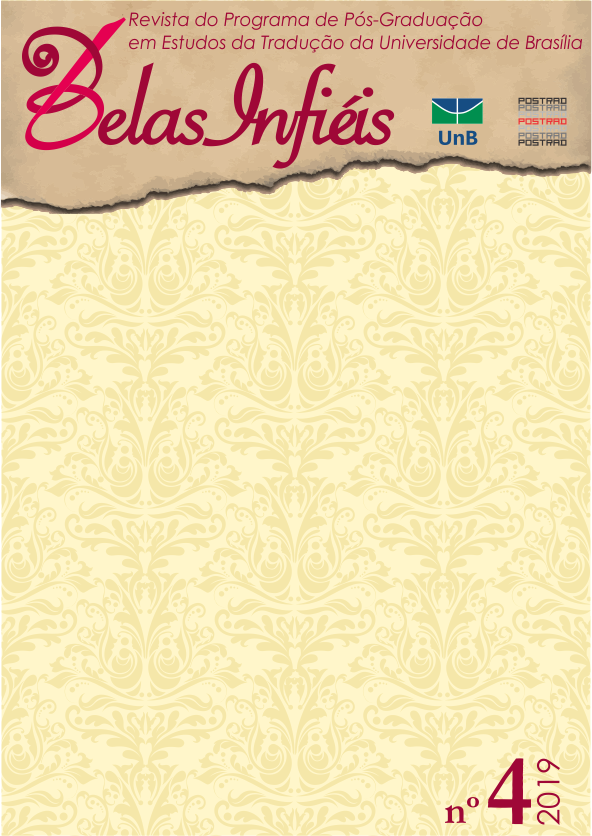Fronteiras da tradução em contos de José Monegal
DOI:
https://doi.org/10.26512/belasinfieis.v8.n4.2019.24279Palabras clave:
Tradução. Fronteira. Regionalismo. Gauchesca. José Monegal.Resumen
Através de estudos sobre a teoria da tradução (Octavio Paz, Rosimary Arrojo, Haroldo de Campos, entre outros) e experimentando o ato tradutório, é tomada como objeto de estudo a obra de José Monegal, escritor uruguaio que, na metade do século XX, publicou contos em seções literárias de jornais de Melo e Montevidéu, muitos deles hoje reunidos em diferentes edições. Com personagens ambientadas na paisagem pampiana, Monegal desenvolve uma literatura gauchesca que se opõe à tradição mítica e heroica, uma vez que trabalha com o humor e o grotesco, caracterizando uma figura pícara do gaúcho. Em seus textos, há uma linguagem composta por regionalismos e marcas de oralidades, exigindo, na tradução para a língua portuguesa, recriações que acentuem marcas fronteiriças, uma vez que esse é outro aspecto presente nas suas narrativas. Essas são questões que se abordam no projeto de pesquisa “Fronteiras da tradução literária”, desenvolvido junto com estudantes bolsistas na Universidade Federal do Pampa.
Descargas
Citas
ANTUNES, Benedito. Notas sobre a tradução literária. Revista Alfa, São Paulo, v. 35, p. 1-10, 1991.
ARROJO, Rosemary. As questões teóricas da tradução e a desconstrução do logocentrismo: algumas reflexões. In: ARROJO, Rosemary. (org.). O signo desconstruído: implicações para a tradução, a leitura e o ensino. Campinas: Pontes, 1992. p. 67-79.
AZAMBUJA, Darcy. Contrabandista. In: AZAMBUJA, Darcy. Contos escolhidos. Porto Alegre: Já, 2005.
CAMPOS, Haroldo de. Tradução e reconfiguração do imaginário: o tradutor como transfingidor. In: COUTHARD, Malcolm (org). Tradução: teoria e prática. Florianópolis: UFSC, 1991. p. 17-31.
MARTINS, Cyro. O príncipe da vila. Porto Alegre: Movimento, 1987.
MONEGAL, José. Cuentos escogidos. Montevidéu, Banda Oriental: 1967.
ROCCA, Pablo. La última frontera (El caso José Monegal). Revista Hologramática literaria ”“ Facultad de Ciencias Sociales ”“ UNLZ, ano I, n. 2, p. 6-32, 2006.
ROCCA, Pablo. Acerca de las representaciones de lo rural. Revista Tradiciones rurales. Comisión del Patrimonio Cultural de la Nación. Montevidéu, p. 14-22, 26 e 27 de setembro de 2009. RUAS, Tabajara. Netto perde sua alma. Rio de Janeiro: Record, 2005.
SCHLEE, Aldyr Garcia. Vocabulário de João Simões Lopes Neto. Pelotas: Fructos do Paiz, 2009.
SCHLEE, Aldyr Garcia. Dicionário da cultura pampeana sul-rio-grandense. v. II. Pelotas: Fructos do Paiz, 2019.
PAZ, Octavio. Tradução e metáfora. In: PAZ, Octavio. Os filhos do barro. Traduzido por: Ari Roitman e Paulina Wacht. São Paulo: CosacNaify, 2013. p. 85-105.
Descargas
Publicado
Cómo citar
Número
Sección
Licencia
Copyright Statement
Given the public access to this journal, the texts are free to use but requires the recognition of the original authorship and initial publication in this journal to be properly stated.
The journal allows the use of works published for non-commercial purposes, including the right to submit the work to publicly accessible databases. Published contributions are the sole and exclusive responsibility of the author(s).
- When submitting papers to be evaluated by the Belas Infiéis journal, the author(s):
- Declare that the contents of the contributions are original and of their original creation, being entirely responsible for their content if there is an objection by third parties.
- Claim to be aware that they should not commit academic plagiarism.
- Declare that the manuscript has not been published, completely or partially, in Portuguese or another language. If it is a translation it should be submitted to the Translated Articles section.
- Declare that the manuscript is not being evaluated by other journals.
- Declare that the manuscript was not submitted to another journal simultaneously.
- Commit(s) to inform the journal of any kind of error or inaccuracy in their contribution (published, in evaluation or in editing) and to collaborate with the editors to make due corrections of the article (when in evaluation or editing) or erratum/retraction (after publication).
- Declare that there is no conflict of interest regarding the published work.
- Authorize its release if it is accepted for publication without any kind of monetary compensation.
- Agree to assign non-exclusive rights to publication to the magazine, remaining free to make their contribution available in other media as long as the publication of the first version in Belas Infiéis magazine is mentioned. They also authorize Belas Infiéis to assign their texts for reproduction in content indexers, virtual libraries and similar platforms.
- Maintain copyright and grant the journal the right of first publication, the work being licensed under theCreative Commons Attribution License.
- Is/Are allowed and encouraged to publish and distribute their work online after the editorial process, which may increase the impact and citation of the published work.
- Authorize the editorial team to make textual adjustments and to adapt the article to the publication rules, when necessary.



















